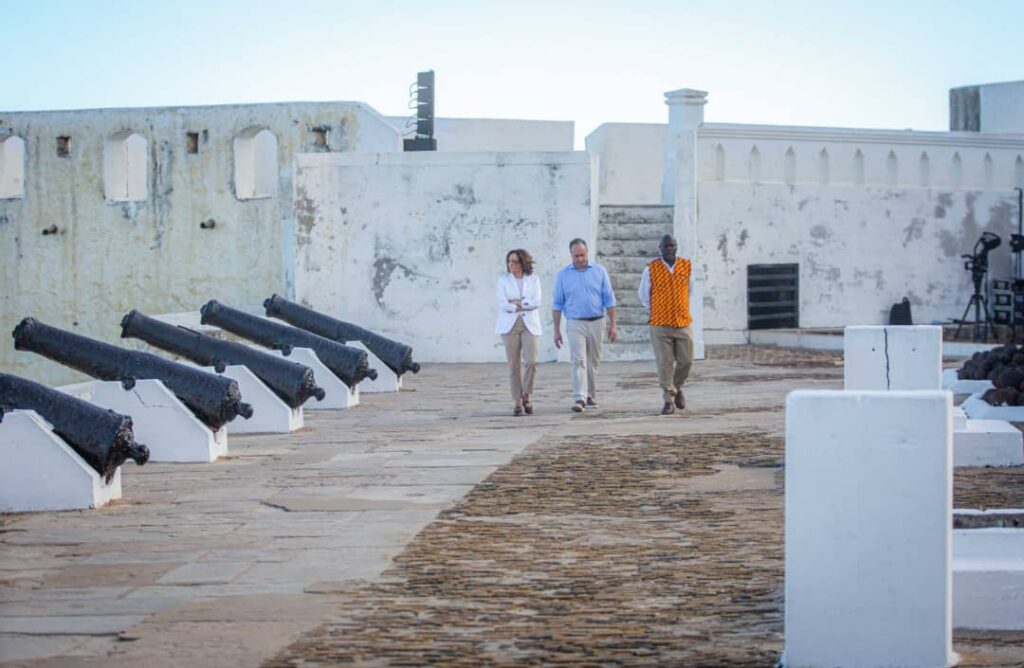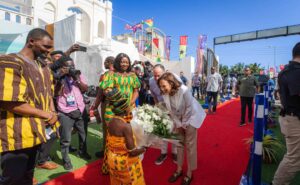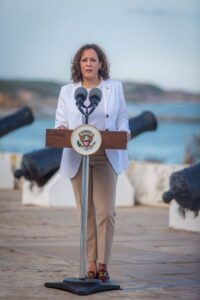Horror of slave trade must teach us about our past, destiny and future – Harris
 Throughout her about 30-minutes tour of the dungeons of Cape Coast Castle, Kamala Harris, the US Vice President looked visibly dejected and sombre, fighting a strong urge to grieve.
Throughout her about 30-minutes tour of the dungeons of Cape Coast Castle, Kamala Harris, the US Vice President looked visibly dejected and sombre, fighting a strong urge to grieve.
Experience
In a shaky voice and almost at the verge of tears, she described the experience as “immensely powerful and moving”, recounting the cruelty that happened in the castle to the media and bemoaned and condemned the crime and atrocity of slave trade, which dehumanised and killed many Africans.
In a mournful demeanour, she said the “horror” of the slave trade was one that should not be forgotten but must be taught and learnt.
She added that the world must be guided by the history of the descendants of the slave victims in the Americas and the Caribbean, who survived hostile systems designed to break and dehumanise them.
“All these stories must be told in a way that we take from this place the pain we all feel, the anguish that reeks from this place.
“And we then carry the knowledge that we have maybe gained here toward the work that we do in lifting up all people, in recognising the struggles of all people, of fighting for, as the walls of this place talk about, justice and freedom for all people, human rights for all people,” she said.
Delegation
Harris who was accompanied by, Douglas Emhoff, the Second Gentleman of US was led by Mr Kwesi Essel Blankson, Western Regional Director of the Ghana Museums and Monument Board (GMMB), who narrated to them the horrific history of the Castle.
Harris noted that the resilience of Africans in the diaspora told another history of endurance, faith, hope, ability to survive and to thrive.
 “The descendants of the people who walked through that door were strong people, proud people, people of deep faith; people who loved their families, their traditions, their culture, and carried that innate being with them through all of these periods; went on to fight for civil rights, fight for justice in the United States of America and around the world.
“The descendants of the people who walked through that door were strong people, proud people, people of deep faith; people who loved their families, their traditions, their culture, and carried that innate being with them through all of these periods; went on to fight for civil rights, fight for justice in the United States of America and around the world.
“And all of us, regardless of your background, have benefited from their struggle and their fight for freedom and for justice,” she said.
A picturesque scenery, collaboratively created by the Gulf of Guinea, historic colonial structures, and arrays of Ghana and US flags in and around the white Palace met Harris on arrival.
Euphoria
The euphoria, which was somewhat overshadowed by the quietness of the ancient city earlier in the day due to strict security arrangements, came alive some two hours prior to her arrival.
Harris, who was in the company of the US Ambassador to Ghana, Madam Virginia E. Palmer was welcomed by both young and old residents who waved small America and Ghana flags and cheered her up.
Many others also stood near and far in groups, with some rubbernecking from behind the walls of their homes to catch a glimpse of the US Vice President.
As early as 09:00 hours, major roads and entry points to the Palace and the castle, including Bakano and Robert Mensah Stadium roads were partially blocked to traffic as part of security measures.
Harris, in line with Ghanaian customs and traditions, made a detour to the Emintsimadze Palace, the seat of the Oguaamanhen, to pay a courtesy call on Nana Kwesi Atta II, before heading to the Castle.
She was treated to authentic traditional music and dance by the Folkloric Dance Group of the Central Regional Centre for National Culture at a durbar, which saw the US Vice President and the Second Gentleman adorned in beautiful traditional Kente cloth.
The US Vice President, while thanking the people for warmly welcoming her, said she hoped it would not be her last visit to Ghana.
 Mr Blankson, who has been the tour guide for most top foreign officials at the Castle, observed that majority of the visitors were concerned about the human rights abuses that occurred at the castle.
Mr Blankson, who has been the tour guide for most top foreign officials at the Castle, observed that majority of the visitors were concerned about the human rights abuses that occurred at the castle.
He said since the experience was emotional, it elicited an emotional response from Harris.
“This place should be remembered for the atrocities perpetrated against innocent people.
“This is a memorial and we expect that anybody who comes here and observes the solemn nature of the facility will be humbled by the history.
“If you look back 100 years ago, some of us would not be here; we would have been in chains.
“I believe that as a facility that has seen a lot of human rights abuses, it should be a place of correction,” Mr Blankson said.
Appeal from Regional Minister
Mrs Justina Marigold Assan, the Central Regional Minister, at the durbar, appealed to the US government to help empower Ghanaian women to reach the decision-making table.
“We believe that when women are involved in governance, we have goddesses who will protect the legal interest of all and push for transformational development,” she said.
The Minister further called for development partnerships among cities in Ghana and the US for mutual economic benefits.
“For example, the city of Cape Coast may establish a partnership with a city in the USA focused on tourism and education and as we promote the diasporan agenda of the government, we will also implement strategies that will facilitate positive connections leading to transformative socio-economic standards of appeal,” she added.
Harris arrived in Ghana on Sunday, latest in a series of visits by top US officials, to begin her three-nation tour of Africa, starting from Ghana, then Tanzania and Zambia.
Her visit is a sequel to a conference hosted by US President Joe Biden with African leaders in Washington.
Harris’ visit is focused on economic development, climate change and food security as the US seeks to strengthen partnerships with Africa.
On Monday, she was received by President Nana Addo Dankwa Akufo-Addo at the Jubilee where the two leaders engaged in bilateral conversations on matters of mutual interest and resolved to deepen the age-old cooperation between Ghana and the US.
By Prince Acquah
Source: GNA
